The community section of my digital capstone project deals with information that is key to the growth of our urban communities. I this section we investigate issues like affirmative action, classism, education, youth advocacy, and the power of church. I interviewed a well-known entrepreneur, Tyrone “Fly Ty” Williams, and Pastor Patricia M. Morris in this section, to bring about understanding in regard to grassroots community cultivation. The main objective of this section is to share several points of view on building Black Economic Empowerment in our urban communities, the destination is to find financial independence for future generations.
Affirmative Action (Merriam-Webster Dictionary) – an active effort (as through legislation) to improve the employment or educational opportunities of members of minority groups or women.

Sean Wilentz. A Dialectic of Doubleness. Lapham’s Quarterly. Website. June 1, 2016
W.E.B. Dubois
W.E.B Dubois spoke about color line issues that will continue to divide our nation in the 21stcentury. It seems that he believed that Affirmative Action was constantly being attacked, especially in higher education and employment (Tierney 122). It has become obvious that depending on what side of the fence you support; there will be disagreements about how Affirmative Action affects our society. Specifically for this section of my project I would like to look at diversity in higher education. Many of the people in urban communities understand the importance of education, but many lack the ability to excel in the school systems. I begin by asking myself a few questions about Black Economics Empowerment and why we continue to struggle to achieve equilibrium in this system.
One of the issue that I dealt with in the community section of this website is the fact that social class remains a key issue in American education. Studies show that many of the schools in urban communities lack educational resources such as skilled teachers and quality curriculums (Hammond 1). This in turn would obviously affect the scores that these students receive, in regard to standardized testing. These issues become influential, as we begin to shed light on median incomes in urban communities. Studies reveal that the United States of America continues to harvest one of the most unequal educational systems, with a tremendous amount of its rationale being based on social status or what some would consider a form of classism (Hammond 1). So ultimately we start to see the correlation between what each class earns annually, and how education along with social status dictate where we live, how we vacation, and what clubs/activities we engage. Until we begin to realize that income is only the result of seeds that have been planted, sometimes generational, we will never be able to educate our communities on ways to avoid unhealthy cycles, or at least strengthen our approaches, as we strive to achieve our form of social economic mobility.
The statistics below will help us begin the conversation. As you can see Black and Hispanic had the lowest median incomes in 2016 and 2017. The data, based on the United States of America, also displays Asians as the leaders when it comes to income earned in 2016 and 2017. The representation of how much is being generated from urban communities is key as we approach the question of why these communities continue to struggle to obtain socio economic mobility. Another issue that concerns me is that the percentage of change in the black population is negative from 2016 to 2017. Does that mean that we should expect things to get worse before better? I hope not, but until we start to approach these issues from a community perspective, it’s going to be very difficult to initiate sustainable changes in our urban communities.
Figure 1
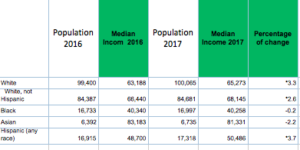
Figure 2
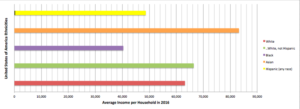
Figure 3
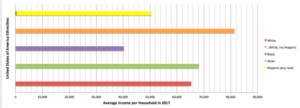
Figure 2 & Figure 3 show the median income for each nationality in 2016 & 2017.
*An asterisk preceding an estimate indicates change is statistically different from zero at the 90 percent confidence level.
Source: U.S. Census Bureau, Current Population Survey, 2017 and 2018 Annual Social and Economic Supplements.
I recently spoke with Tyrone “Fly Ty” Williams, (Cold Chillin Records and Brooklyn United) about how education creates potential for residents in our communities to elevate their worth. Mr. Williams grew up around entrepreneurs, therefore his plight into the business world was a natural progression. On the other hand, many people in our communities have the desire, but lack experience and resources, which is where education becomes a viable means to serve our communities in both capacities (Fairlie & Robb, p. 289). Tyrone’s organization, Brooklyn United, takes kids from urban communities, and creates an avenue for them to attend college through scholarships. They do this by training kids to play instruments, excel academically, and work cohesively in their community with other like-minded individuals. The importance of this organization stems from their ability to change the narrative for the young people in urban communities.
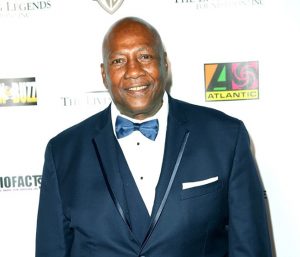
Williams, Tyrone. Honorees Celebrated At The Living Legends. 2017. Taglyan Complex, Taglyan Complex. Website. October 2, 2018
Tyrone ‘Fly Ty’ Williams
Here is my interview with Mr. Williams about growing up in New York City, discovering some of Hip Hops most notable artists, and moving on to send young people to college with scholarships.
Here is one of Fly Ty’s recruiting classes displaying why Brooklyn United has become one of the major hubs for producing academic and musical excellence.
Whitehead, Taylor. Brooklyn United “Evolution” Drumline @ Warren County 2017. May 6, 2017.
I mentioned earlier that United States of America is a place where your education usually depends on what community your school is located in. We see prep schools are usually located on the outskirts of our communities or the suburbs, while many of our public schools are smack dab in the middle of some of our most problematic urban environments. So the power of someone like Fly Ty in our communities is worth millions, maybe billions of dollars, due to the fact that he has found a way to reach a population that has already been ostracized by a system that makes it’s educational decisions based on demographics. In other words, where you start is where they bet you will end up. Not based on your intellectual merit or determination to succeed, but simple on the fact that your neighborhood is deemed unproductive. I believe that the program that Mr. Williams has built is an excellent model for creating change from the inside of our communities. You promote academics through extra curricular activity, which leads to higher education, which leads to mental diversity. I’m convinced that this needs to happen in a class driven society which continues to function bureaucratically. We have to take the initiative to create change from within before change can be created on the outside.
Paulette Isaac stated, “that along with education, urban communities also suffer from proliferating crime rates, deterioration, decreasing populations, persistent poverty, and of course unemployment” (2-3). Although all of these issues could be broken down and examined in their own right, I believe that education is the best place to begin. As stated earlier, a lack of education allows these issues to continue to surface as major issues in our communities. That’s where the church could possible double or triple it’s value in the community. They already have the location, and with the help of elected officials they should have access to the resources that will help produce results in the community. Learning centers and training programs would seem to be a logical places to begin, the objective would be to build awareness through the African American Churches to increase socioeconomic mobility in our communities.
As we applaud the efforts of organizations like Brooklyn United, it would be naïve to believe that these organizations will be able to save our communities independently. Let’s say that we increased the number of college graduates in urban communities by 30 percent (which would be a great start) we would still have a tremendous amount of work ahead of us in creating employment opportunities, increasing community ownership, and building sustainable generational wealth. Studies show that the African American Church is positioned to play a major role in building Black Economic Empowerment (White p. 42). Many of these churches have been in their perspective neighborhoods for years, many of them own the property they are located on, and usually have built a rapport in the community. With that being said, they are positioned to act as resource centers for adults who may not have been positioned, our disciplined enough, to successfully complete a program like Brooklyn United. I think it would be very beneficial to the community if the church begins to ask the question, “how can we better serve our community?”
The next community leader I decided to speak to was the Pastor of The New Springfield Missionary Baptist Church. Reverend Patricia A. Morris manages to run a successful business and pastor a church, while recently completing her doctorate degree in Theology. Her view of Harlem, NY is progressive, but realistic. I wanted to get the pastors take on the role that education should play in our urban communities. I figured that her work, as a grassroots advocate, would lend to creating sustainability in urban neighborhoods. Her ability to connect the community issues through past and present experiences was quite insightful and I am ecstatic that she accepted my request to be apart of this project.
Pastor Morris explained, “the black church, as a resource, is essential in the education of urban communities and the people attaining socio economic mobility.” She believes that everyone in the community should be equipped with a high school diploma, or GED to perform on a competitive level in the work force. She admitted that some people in our communities are naturally talented with their hands, therefore the traditional academic approach may prove to be inapplicable. Pastor Morris is an advocate of trade school, and alternative methods of learning. The fact that Pastor Morris also owns a funeral home in the community, gives her a unique perspective on what it takes to serve the community on a grassroots level. Her ability to identify with educating urban communities in order to create socio economic mobility through credit freedom, rent control, and self investment are indicators that her approach and experience align with the needs of the people. As a theologian she continues to rally for male mentorship, self respect, and setting boundaries as we educate our youth. Although Reverend Patricia A. Morris has achieved tremendously, she has made a vow to educate our urban communities through information and genuine empathy, which I believe should be an excellent formula in regards to creating socio economic mobility, in our communities, as we build for tomorrow.
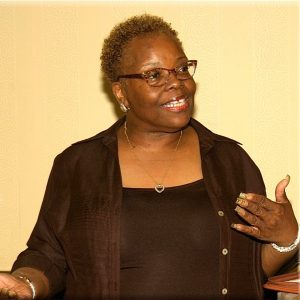
Morris, Patricia. Board of Directors. Bridging Access to Care, Bridging Access to Care. Website. October 2, 2018.
Reverend Dr. Patricia A. Morris
Listen to my interview with Reverend Dr. Patricia A. Morris about growing up in Harlem and holding the church accountable for creating change in the communities.
Another example of community activism through the church is Floyd Flake who pastors a 23,000-member church in Jamaica, Queens. His church is dedicated to the commitment of praise, worship, stewardship, evangelism, and economic development. Although Flake has experienced some ups and downs in his personal and professional life, our urban communities should acknowledge his commitment to community development. Reverend Flake stated, “I’m interested in investment, as a way to generate in those particular communities where jobs, commercial strips, entrepreneurs, and small businesses can hire people who will not become welfare recipients, who will not become people who occupy these jail cells.” This type of concept introduced through the black church could possible influence billions of African American people, which would change the narrative of a classist system that continues to feed knowledge to wealthy communities, and starve less fortunate communities. Flake and his staff found a way to work with federally funded programs to create communities that are built from the inside to cultivate growth on the outside, and although this type of education is not traditional, students in urban communities might benefit more from this type of education instead of taking courses about Family Consumer Science or Contemporary World Issues.
“I wrote this song based on issues that I witnessed as potentially destructive behavior in or urban communities. Problems like police brutality, gentrification, food equality, social awareness, and environmental sustainability seem to be rooted in racial injustice in many communities through out our country. Although I am not at liberty to say that racism is the only thing that’s driving these issues, it seems that many of these issues intertwine with our nations inability to treat it’s citizens with justice and equality. This song offers my perspective as a African American man in the year of 2018. I’m sure that my perspective on racism will evolve as we move forward in time, but as of now you get the opportunity to hear me deal with my concern about past and present racial issues in our communities. This music serves as a cry for our voices to be heard, it was created to educate urban communities about the power of our voices.” – Jeffrey C. Suttles
Racism You Gotta Go
We been striving for our people to be free
They want change but some can’t see
It’s our time we been waiting to long
Jim Crow know by the end of this song
We feel Obama cause he look like us
They never showed love, they never gave him trust
2016 is here brother man
We gotta do better, we gotta take a stand
Goo Wee
Hook:
Racism you gotta go
I’m just here to let you know
Racism you gotta go
I’m just here to let you know
When I was young my father told me
Boy live your life one day you’ll see
Malcolm and Martin tried to pave the way
Neither one them lasted to this day
I wonder if they knew this is how it would be
Their great grandchildren can’t be free
I said it once and a thousand times
Racism and Injustice lose when we draw the line
Hook:
Racism you gotta go
I’m just here to let you know
Racism you gotta go
I’m just here to let you know
Wow O Wow
Hook:
Racism you gotta go
I’m just here to let you know
Racism you gotta go
I’m just here to let you know


